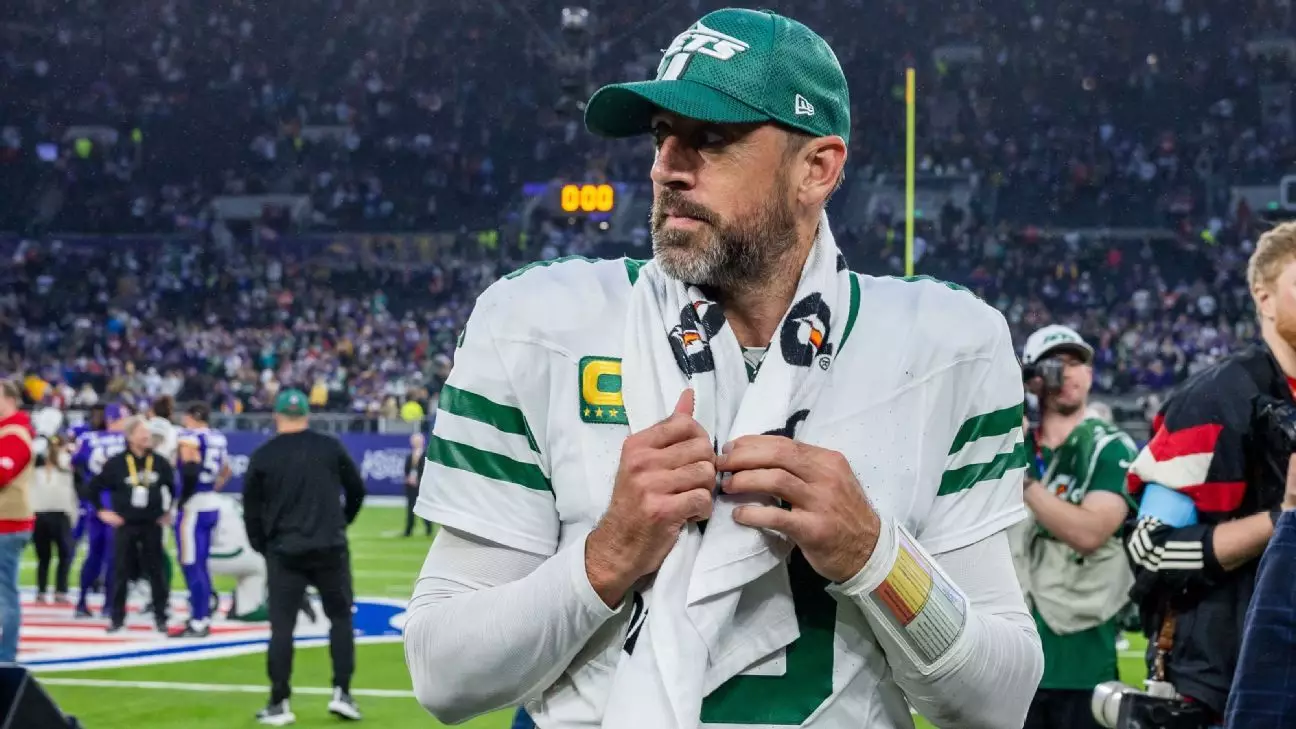In an unexpected turn of events, the New York Jets parted ways with head coach Robert Saleh after just five games of the current NFL season. Aaron Rodgers, the marquee quarterback of the team, utilized his platform on “The Pat McAfee Show” to address allegations that he had a hand in the coach’s ousting—an assertion he categorically rejected. The prevailing sentiment, apparent in Rodgers’ remarks, was one of disbelief regarding the extent of presumed influence he wielded within the organization, which he regards as exaggerated.
Rodgers firmly stated, “I resent any of those accusations because they are patently false.” His loyalty to Saleh was highlighted amidst the backdrop of swirling rumors, suggesting a complicated dynamic of power and responsibility within the Jets’ front office. The controversy raises critical questions about the interplay of player influence in coach decisions, particularly when a high-profile athlete is in focus.
With Saleh gone, Jeff Ulbrich ascended to the role of interim head coach. His first task includes evaluating and restructuring the offensive staff, a move that could potentially impact Nathaniel Hackett, the team’s offensive coordinator and a close friend of Rodgers. Reports indicate that even before Saleh’s firing, there were considerations for Hackett’s possible demotion. The implications of these actions weigh heavily not only on team morale but on the relationships that exist within it.
Ulbrich’s indecision about the staff suggests an underlying tension; while he faces the challenge of leadership amid disarray, the necessity of accountability and performance pivot the team’s trajectory. It is evident that there is a collective push for improvement, as highlighted by players’ feedback during internal meetings—reflecting a desire for consistency and clear reasoning behind the leadership transition.
The immediate response from players to Saleh’s departure was one of shock and disbelief. Notably, linebacker C.J. Mosley and offensive tackle Morgan Moses voiced their surprise, reflecting the sentiment that such a dramatic shift could be indicative of larger issues at play within the organization. Players like Tyler Conklin conveyed empathy toward Saleh, acknowledging that the responsibility for the team’s inadequate performance fell upon everyone, not just the coach.
This consensus underscores a crucial aspect of professional sports: accountability often lies distributed among players, coaching staff, and management alike. Conklin’s statement that “a lot of us have talked about this as a production business” reinforces the notion that the team’s struggles stem deeper than any single individual. It emphasizes collective responsibility, echoing the calls for improved performance from within.
Amidst the chaos, Rodgers has maintained a measured stance, reiterating his support for Ulbrich and the newly evolving coaching strategy. His candid reflection on the situation, coupled with his acknowledgment of personal performance shortcomings, highlights his role as both a leader and participant in the ongoing narrative of the Jets’ season.
The quarterback expressed concern for the recently dismissed Saleh, saying he took the transition “harder than almost anybody.” This perspective humanizes the scenario, showing that while competitive environments often breed conflict, they can also foster camaraderie and mutual respect among players and coaches alike. Rodgers’ commitment to improve on-field performance is a testament to his dedication, not only to the game but to the individuals involved in it.
As the Jets prepare to tackle the Buffalo Bills in an upcoming Monday night matchup, the implications of Saleh’s dismissal will undoubtedly linger over the team. Despite a rocky start to the season, the Jets, now under interim leadership, have the opportunity to recalibrate their focus and objectives. With players expressing a desire for unity and a shared purpose, the moment presents both challenges and opportunities for growth.
The New York Jets find themselves at a pivotal crossroads. Organizational changes, while disruptive, can also serve as a catalyst for transformation. As the team seeks to reclaim their footing in the AFC East, it will require adaptability, collaboration, and an unwavering commitment to improvement. The continuation of narratives surrounding influence, accountability, and leadership will undoubtedly shape the franchise’s immediate future and player dynamics in the weeks to come.

